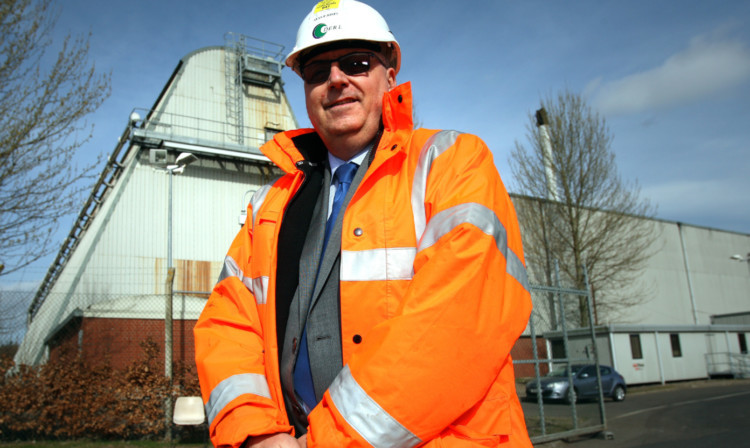The future of the loss-making Baldovie incerator is in doubt after it emerged that owners Dundee City Council are considering alternate means of disposing of the city’s waste.
Long-term operators Dundee Energy Recycling Limited (DERL) said a mothballing of the plant, which has posted a further £5 million loss, was one of three possible outcomes to a new waste contract tendering process being run by the local authority.
The seven-figure loss for the 18 months to June 30, 2013, was accrued in a period in which the incinerator was out of action for a year following a major fire.
Site owner Dundee City Council is looking for a new operator in order to bring forward investment to ensure the city complies with changes to waste-management legislation.
The process could result in Baldovie which employs 44 staff and has received millions of pounds in taxpayer support since first opening its doors in 2000 being mothballed if a bidder comes forward with a viable alternate plan to deal with rubbish collected in Dundee and in neighbouring Angus.
Newly published accounts state that DERL does not expect to continue to operate the facility after the end of next year, despite contracts being in place for the company to process waste from the two authorities through to 2020 and DERL holding a lease over the Baldovie plant until December of that year.
Two ‘industry days’ for possible bidders for the plant have been held so far, and DERL said it was unclear what the outcome to that process would be.
The company said there were a number of possibilities: a full sale of the group; a part-sale in which certain assets and liabilities would be divested by the local authority; and a third scenario which would see the facility closed if a bidder came forward with a viable plan to process waste at a separate site altogether.
In his directors’ report to the accounts, DERL managing director Alan Jones said the ultimate impact on the group was “not certain” at this point.
“At present, the group is giving full support to the Dundee City Council project team to facilitate the process,” he said.
“However, it is clear that an early termination would be needed of the group’s existing long-term contracts, which run to March 2020, for Dundee City Council and Angus Council waste.
“The same applies to the group’s lease of the plant, which currently runs to December 2020. Independent valuation exercises regarding the group’s business and covering these implications are now commencing.
“These will include potential compensation for early contract termination, and will address the position on outstanding loans and other debt with Dundee City Council which had been expected to be repaid from forward earnings streams.
“At the appropriate time the group will discuss these issues with Dundee City Council as both the 100% shareholder and major creditor.
“Notwithstanding this, the group’s businesses continue to trade as previously.
“Accordingly, the directors have taken a prudent view with regard to asset impairment and for this purpose have assumed that the group in its present form will not continue to trade beyond January 1, 2016.”
The business reported a £5.02m loss in the most recent accounting period which was extended by six months due to the impact of the devastating blaze in May, 2012 a narrowing of the £5.57m loss made in the 12 months previously.
Overall revenues for the period increased by £1m to £7.61m.
Mr Jones said three independent investigations had been carried out but no conclusive explanation had ever been established as to why the fire took hold.
He said certain payments had been received by DERL from its site’s insurers since the blaze occurred, but a final settlement had yet to be reached.
The 14 months in which the plant was offline were used to implement significant upgrades to it, including £7.94m of work approved by Dundee City Council as an extension to the company’s current lease of the plant.
DERL said five staff, including members of the management team, had left the business in the wake of the fire but its workforce was now back up to its previous levels following a recruitment programme.
Fixed-asset impairments meant the firm’s overall operating loss for the year had increased from £5.33m in 2011 to £5.89m.
